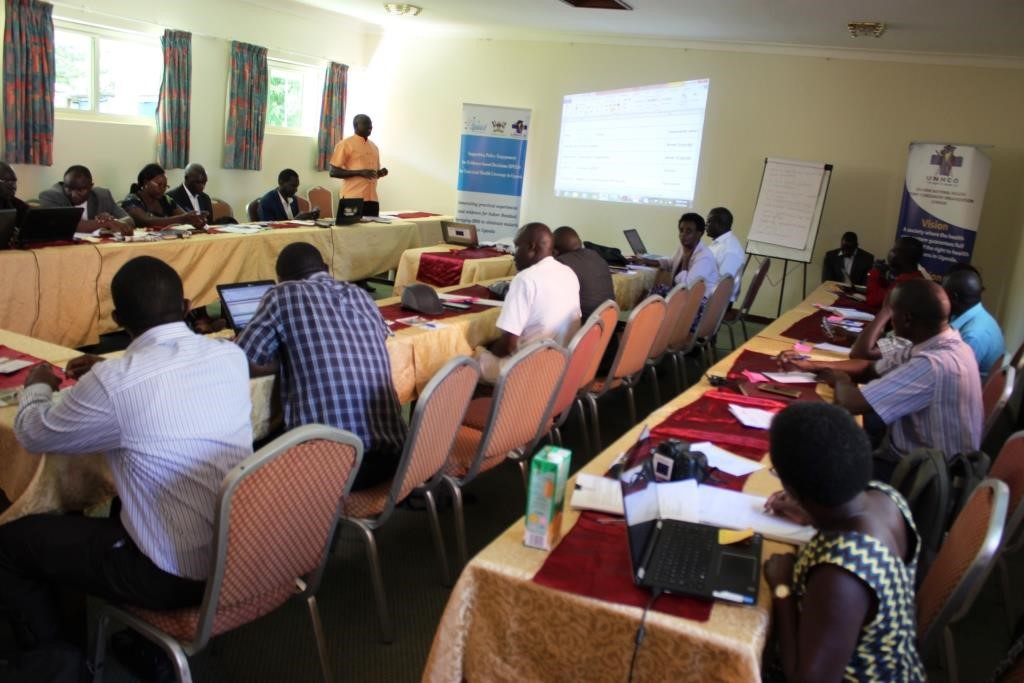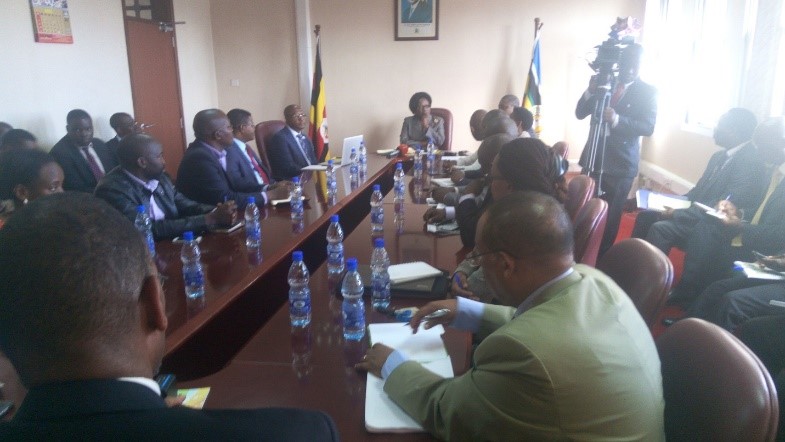SPEED Uganda - Government allocates 10 million USD to IRS to fight malaria
Discussion details
BACKGROUND
In Uganda, approximately 16 million malaria cases are reported, and over 6,000 deaths annually. Every day, up to 16 people die in Uganda, as a result of preventable Malaria. This situation has become Uganda the 9th highest malaria burden country in the world. The burden of malaria is higher than HIV/AIDS, yet malaria has not received as much attention as HIV/AIDS. Every Ugandan gets an average 2.5 episodes of malaria per year. Malaria contributes up to $200 million annually in lost income, which is a threat to economic growth.
SPEED project is co-funded by the European Union. Its objective in Uganda is to engage and influence policy makers with contextually adapted evidence for health policy and systems changes. The project supports policymakers to monitor the implementation of vital programs for the realization of policy goals towards UHC. They enhance the expertise, knowledge and resources for policy analysis, advice and influence at Makerere School of Public Health and partner institutions.
When measuring the implementation of malaria policy in 2016, researchers investigated three elements of the national policy: better treatment of malaria, distribution of insecticide-treated bed nets and indoor residual spraying (IRS). “These are critical methods for fighting malaria in Uganda. I call upon the public to embrace them”, said Hon Sarah Achieng, State Minister of Health for General Duties.
Malaria incidence went down from 2008 to 2013, when the combination of the three policy elements were implemented. However, a malaria epidemic developed when IRS was stopped in 2014 and the supply of medicines became erratic. Because malaria had reduced in recent years, the urgency to implement some strategies in the malaria policy fully had decreased. “We need to rejuvenate our efforts to eradicating malaria in Uganda. IRS is the most effective way to get rid of mosquitoes but must be used in combination with other control mechanisms”, said Dr Jimmy Opigo, Manager of National Malaria Control Program (NMCP).
Based on their scientific analysis of the causes of the malaria epidemic, the advice from SPEED in 2016 was to restart IRS and improve provision of malaria medicines. Development partners who fund 95% of malaria programme were opposed to this strategy in the malaria policy. The main reason they gave, was that IRS was too expensive and not effective enough. Therefore, Ugandan government was discouraged to scale it up. “IRS is extremely resource intensive and presents considerable logistical challenges which require well-coordinated and meticulously planned intervention”, said Ms. Margret Sancho, Director of USAID/Uganda Health/HIV office.
PROCESS - SPEED contribution to this policy outcome in Uganda
Providing stakeholders with evidence informed analysis about scaling-up IRS
9th November 2017: consultative meeting with local leaders and healthcare managers
SPEED consortium organised a consultative meeting in Gulu District (northern Uganda) to inform local government leaders and healthcare managers about the research findings and the need to resume IRS. Discussions revealed that IRS was the most cost-effective intervention to eliminate malaria in Uganda if all the available resources are efficiently utilised. The local leaders supported the initiative in that meeting.

1st March 2018: Creation of coalition to inform policies and practices for scale-up of IRS to contribute to the elimination of malaria
SPEED consortium partner Uganda National Health Consumer Organisation (UNHCO) led the creation of a coalition to advocate for scale-up of IRS as a core intervention for malaria control in Uganda.
SPEED Project Director Prof. Freddie Ssengooba provided evidence that malaria had reduced in Northern Uganda during IRS implementation but cases increased soon after the intervention was stopped. “Malaria still causes huge losses to the Ugandan health system and leads to economic losses at household and community levels. In fact, it cuts across all sectors of life”, said Dr Freddie Ssengooba. “There is a need to have a strategy that will cover the entire country since malaria is in all parts of the country”.
The Economic Policy Research Centre (EPRC), partner in SPEED, provided evidence that IRS can be implemented in a cost-effective way – more so by using decentralised government structures – districts. These have been trained and communities sensitised especially in northern Uganda over the last 3-4 years.
The Uganda Parliamentary Forum on Malaria, consisting of Parliamentarians, invited the SPEED consortium to give testimony about the research findings and recommendations. The Parliamentarians were convinced by the evidence provided, and committed to provide the needed support to ensure that IRS initiative is allocated enough funds through the budget allocations. “The forum is to make aware all members of parliament concerned about the malaria situation in their districts”, said Parliamentary Forum chair, Hon Balyeku Moses.
7th March 2018: The coalition met with the Speaker of the Parliament of Uganda
The coalition shared with the Speaker of the Parliament evidence on the status of malaria in the country and how the current interventions have worked. The leader of SPEED, Makerere University School of Public Health has led the process of evidence-generation on cheaper models to scale up IRS as a key strategy in eliminating malaria in the country. In the meeting relevant stakeholders in Uganda on the fight against Malaria were present, such as USAID, DFID, Malaria Control Program (MCP), WHO and the Malaria Consortium.
The Speaker of the Parliament was informed that the combination of malaria control efforts is the best strategy to control malaria. SPEED offered scientific evidence and cost-benefit analysis for IRS to show that it is effective and affordable. “IRS is the best strategy and cost effective especially when it’s implemented by local people”, said Dr Aloysius Ssennyonjo, SPEED project manager.

Following the discussion, the coalition informed the Speaker that political will of the government and the increase of domestic funding will be essential to support programmes intended to eradicate malaria in the country. A complete implementation of national malaria policy, including IRS is critical. “Though your office Rt.Hon. Speaker, we request you to persuade the government to Increase domestic funding for malaria to at least 285.6 million USD towards accelerated implementation of the UMRSP for 2018-2020 and to establish a Malaria Trust Fund”, said Mr Peter Mbabazi, expert at Malaria Control Program, Ministry of Health.
RESULTS
5th April 2018: President of Uganda Museveni launched the Mass Action Against Malaria strategy aimed at eliminating Malaria in Uganda.
The president emphasized the fight against malaria should target the mosquitos through use of treated nets and indoor residual spraying. “To eliminate malaria, it needs more effort than vaccination. We need to kill the mosquito, how? By using treated bed nets, through residual indoor spraying every six months and outdoor spraying, although there were some controversial issues.”
During the launching ceremony, the President showed political will, stated that IRS should again be part of the malaria programme, paid by the government if development partners are not willing to contribute. “Shs350 billion is not too much, if it is what we need to eliminate malaria”.
In addition, the President will increase domestic funding by 10 million USD to pay for indoor residual spraying, as part of the fight to eradicate malaria in Uganda. “I totally agree with the idea of creating a fund for malaria. If you raise funds from private sector, the government can contribute. We could also fund scientists to deepen their research. It should aim at eliminating the mosquitoes”, said the President of Uganda Museveni.
|
SPEED: It is a project co-funded by the European Union. It wants to strengthen policy analysis at Makerere University School of Public Health (MakSPH) and contribute to accelerating progress towards universal health coverage and health systems resilience in Uganda. Therefore, it engages and influences policy makers with contextually-adapted evidence for health policy and system changes to advance UHC. The project supports policymakers to monitor the implementation of vital programmes for the realisation of policy goals for UHC. It enhances expertise, knowledge and resources at MakSPH. |

Log in with your EU Login account to post or comment on the platform.